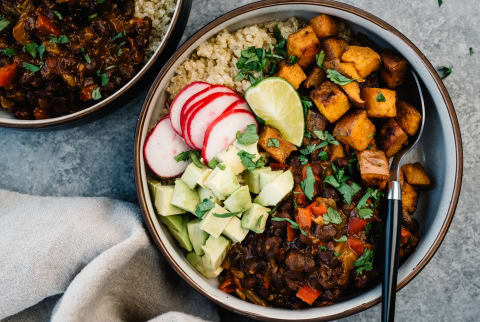Advertisement
Here's What Doctors Recommend Eating If You Have Endometriosis



Endometriosis refers to a condition in which the tissue that normally lines the uterus grows outside in other parts of the body, most commonly in the abdominal cavity. It can cause a whole host of unpleasant symptoms, including painful cramping, long heavy periods, constipation and bloating, painful sex, urinary problems, low back ache, and chronic fatigue. "These symptoms are a result of the inflammation, irritation, and adhesions," says Aviva Romm, an M.D. who specializes in holistically treating women's hormonal issues.
While there are a number of environmental changes that can help with endometriosis (for a great rundown, check out this article), modifying your diet is a great place to start. The bad news? "There's no one-size-fits-all diet for women with endometriosis," says Jolene Brighten, D.C. and author of Beyond the Pill. "We do not have enough substantial evidence or understanding of what causes endo, so we can't say either way what will be most effective for the majority of women."
The inflammation/endometriosis connection.
Certain diets have been found to be helpful, though, particularly when they address specific symptoms or underlying causes. "We do know that there is an inflammatory component, which is likely why many women with endometriosis report positive effects when eating a diet rich in omega-3 fatty acids1 and vegetables, including herbs such as turmeric and ginger," says Brighten.
Romm agrees: "Studies have shown that increasing fatty fish intake, and also a diet rich in fruits and veggies, can not only reduce endometriosis risk but may actually reduce lesions and pain." She notes that while this may seem simple, in her practice she's found that many women aren't getting a recommended eight servings of combined fruits and veggies each day. "I recommend four servings of greens, two of a rainbow assortment of veggies, including sweet potatoes and winter squash for their immune-health-promoting vitamin A, and two servings of berries, which are rich in phytochemicals that help reduce inflammation," Romm says.
How estrogen can play a role.
Beyond inflammation, your body's estrogen levels can have a major effect. "One of the factors that can cause endometriosis is an overproduction of estrogen or the overaccumulation of estrogen that the body cannot remove2," says Nicole Rivera, D.C. and founder of Integrative Wellness Group. She recommends avoiding exposure to external estrogens from food. "Limiting animal products, including meat, poultry, and dairy can reduce the buildup of excess estrogen in the body," she says. (Brighten also thinks red meat should be avoided: Certain red meat may also prove problematic3 because of its potential to raise inflammation4," she says.)
In addition, while limiting those foods, Rivera recommends supporting liver function to help remove any excess estrogen from the body. To support the liver, she suggests loading up on cruciferous vegetables, which include broccoli, cauliflower, kohlrabi, kale, bok choy, arugula, cabbage, and Brussels sprouts. Soluble fiber also plays a big role in liver function. "Soluble fiber allows for toxic buildup in the liver to be excreted more effectively through the gut," she says. "Foods rich in soluble fiber include steel-cut oats, mung beans, black beans, lentils, white beans, navy beans, and black-eyed peas."
Addressing endometriosis symptoms with dietary changes.
If the dietary changes don't provide relief, consider looking at environmental factors, considering supplements, or consulting a functional medicine practitioner.

Why Nutrition Is Key To Changing Your Relationship With Alcohol
Brooke Scheller, DCN, CNS

Why Alcohol Sabotages Your Gut Health & How To Get Back On Track
Brooke Scheller, DCN, CNS

Why Nutrition Is Key To Changing Your Relationship With Alcohol
Brooke Scheller, DCN, CNS

Why Alcohol Sabotages Your Gut Health & How To Get Back On Track
Brooke Scheller, DCN, CNS

Why Nutrition Is Key To Changing Your Relationship With Alcohol
Brooke Scheller, DCN, CNS

Why Alcohol Sabotages Your Gut Health & How To Get Back On Track
Brooke Scheller, DCN, CNS

Why Nutrition Is Key To Changing Your Relationship With Alcohol
Brooke Scheller, DCN, CNS

Why Alcohol Sabotages Your Gut Health & How To Get Back On Track
Brooke Scheller, DCN, CNS














